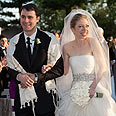Quite a few Israelis (as well as Americans) felt a slight sense of unease this past week in the face of photographs of America’s new young couple, Chelsea and Marc, at their interfaith marriage ceremony. More accurately, they felt uneasy seeing the groom draped with a prayer shawl and wearing a kippah alongside his wholly gentile bride.
Many intriguing questions remained open in the wake of this wedding (for example, where were the groom’s parents, or what prompted distinguished rabbi James Ponet to join the farce.) However, the wedding also served as an exclamation mark – a fleeting, momentary flash of light – in respect to the attitude of young American Jews to their Jewishness.
American Wedding
Yoram Kaniuk
Op-ed: Clinton-Mezvinsky wedding shows that it’s easier to be Jewish in America than in Israel
Ironically, these types of interfaith ceremonies featuring a priest and a rabbi are no longer common in the United States. Reform rabbis also avoid them – a fact that does not stop one third of married American Jews to live with non-Jewish partners.
From an American social point of view, this is of course a symbol of success: The Jews are well integrated in America. It’s hard to believe that until the 1970s, the rate of intermarriage in the US was less than 10%, and it mostly involved men whose wives later converted.
Today, most American Jews (as well as non-Jews) address such marriages as part of a pluralistic lifestyle. This is the norm. They are convinced that in an open society with such breached cultural boundaries, this is an inevitable process.
According to Brandeis University Professor Sylvia Barack-Fishman, who is among the most prominent researchers of US Jewry, fewer than half of all American Jewish parents actively object to this type of marriage for their children. A study by the American Jewish Committee showed that this message is gaining a foothold, may heaven help us, in the Orthodox community as well. When asked whether they will be pained should their child marry a gentile, only 84% of Orthodox respondents said it would. As it turns out, even an American parent whose Jewishness is very important to him no longer feels a pang of guilt when his son brings home a shiksa.
Not much we can do
Some of you may say that Marc may be comforting himself with the thought that his wife would choose to somehow convert after the wedding? Well, the likelihood of Chelsea choosing this option is low: It happens in only one of five interfaith couples.
The question of whether this should be of any interest to us Israelis has many facets. It does interest those concerned about Judaism’s survival as a practical religion; it also interests those concerned about the Jewish people’s survival as a nation, as well as practical thinkers who believe that a unified, strong Jewish community in America is essential for the State of Israel to survive.
The more interesting question is what we can do: Regrettably, it appears that we can do very little. This problem is the hot potato of community leaders: They understand that the key has to do with guiding the parents, initiating Jewish social ventures, and of course, high-quality Jewish education. Much of the money that was spared after the collapse of our brother Madoff is currently invested in this struggle.
On the other hand, we Israelis have the power, as always, to cause damage: Fostering our alienation to the world’s second-largest Jewish center, ignoring its feelings, and disparaging its means of worship may accelerate the assimilation process and crudely sever a possibly last source of hope and solidarity.

Marc and Chelsea. Interfaith marriage
Photo: AP
מומלצים















